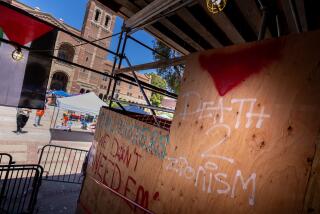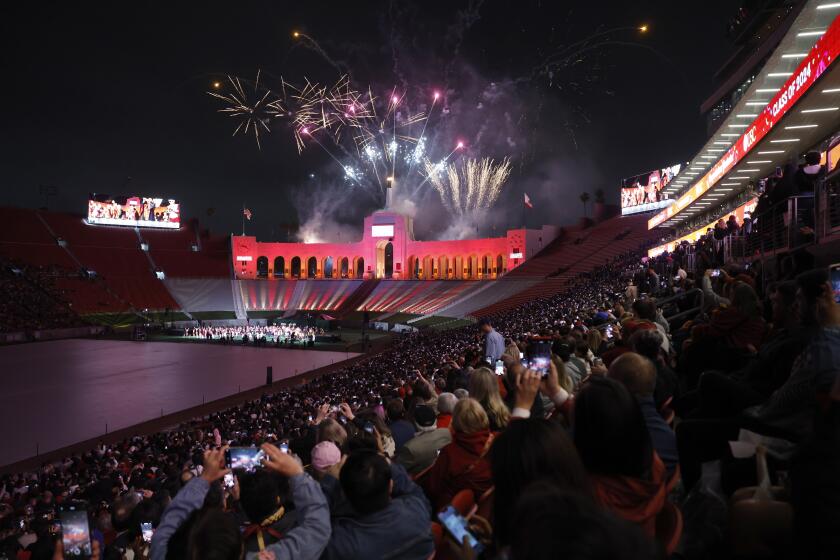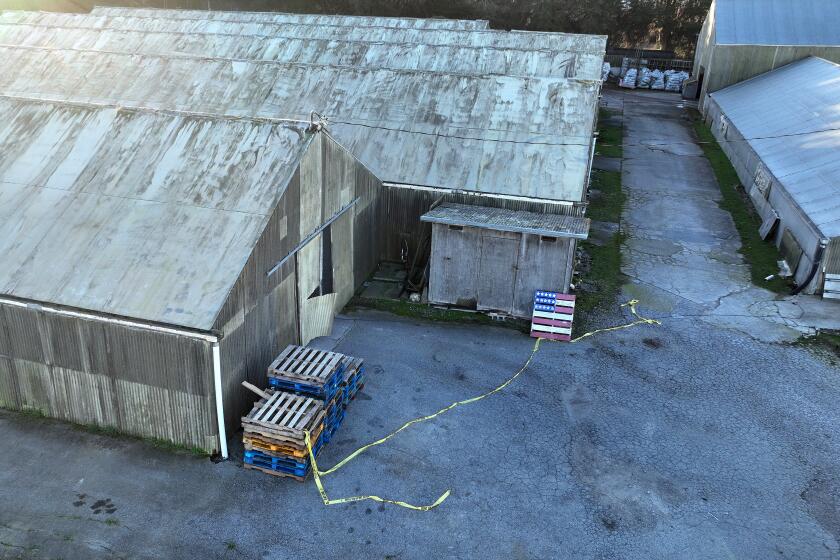Home, Sweet Home : Social services: The operators of Oxnard’s only permanent family shelter are full of ideas for a rosier future after the city gives up trying to relocate them.
It was the news Zoe Christian Center’s residents and operators had been waiting for.
“Finally, they are giving us the green light to do what we want to do,” Zoe co-founder Fred Judy said Wednesday, sitting in the shelter’s classroom for homeless children.
On Tuesday, the Oxnard City Council quit trying to relocate the shelter and gave the founders a chance to remain on Rose Avenue.
“We’re going to have the No. 1 program,” agreed his partner, the Rev. Jim Gilmer. “All those people that criticized us are going to have to eat their words.”
Finally, they will have a chance to fulfill their vision of creating a state-of-the-art facility that the entire county can be proud of, Judy and Gilmer said.
But first they will have to clear the area of potential health hazards and come up with about $3 million to buy and fix up the property.
The challenge doesn’t faze them. It won’t be the first time that Gilmer and Judy have faced considerable odds.
Nine years ago, they founded the city’s only permanent homeless shelter for families in a run-down labor camp used to intern Japanese-Americans during World War II.
Housing more than 130 residents, the Zoe shelter is the largest in Ventura County, where about 4,500 homeless people live.
“We built this place from scratch,” Judy said Wednesday, as walked through the shelter’s courtyard.
“We laid down the asphalt and landscaped with our own hands. This whole place was full of weeds this high,” he said, extending his arm shoulder-high.
But since the city denied Zoe an operating permit in 1988, the shelter has fallen into disrepair, Judy and Gilmer said. Unable to secure funding for a shelter without a city permit, they had to make do on a shoestring budget.
“Look at this,” said Gilmer, pointing to an uprooted gas pipe. “We have six rooms that don’t have heating. We’re giving people extra sleeping bags and blankets, but it’s still cold.”
Gilmer and Judy have big plans for the shelter. All the plumbing and electricity fixtures, now half a century old, need to be replaced, they say.
The old barracks with peeling paint and broken windows must be razed. New buildings should have rooms with attached bathrooms, so that “babies don’t have to take baths in communal bathrooms,” Judy said.
Today, two washing machines housed in a shack serve as a laundry for the shelter. Four broken machines sit outside. Zoe’s founders plan to build a new laundry room and buy new washing machines.
The aging kitchen and dining rooms should be replaced, they said. And the snack shop will be taken down, Judy said. In its place, they will build a grocery store facing the street, so shelter residents can earn a living.
The infirmary will move out of a trailer and into a permanent structure, Gilmer said. And the shelter’s capacity will increase to accommodate up to 250 residents.
“This is going to be more than a shelter,” Gilmer said. “This is going to become a self-contained community.”
It is an ambitious dream for an organization that still owes the city more than $50,000 in unpaid utility bills. Long before the dream has any chance of becoming reality, Zoe must overcome considerable roadblocks.
In 1988, the city Fire Department urged the City Council not to renew Zoe’s operating permit because the shelter is located in an industrial area near hazardous materials.
As a result, the shelter has been operating with an expired permit since 1989. No sooner did the permit expire than Zoe’s funding started to dry up.
First, the federal Department of Housing and Urban Development withheld funds, citing environmental concerns. The state, the county, several cities and private donors followed suit.
By last year, Oxnard officials were sufficiently concerned about the shelter’s long-term survival that they set up a task force with other cities to look into building a new shelter with a different operator. But representatives from the other cities soon dropped out of the group.
Pressed by a state mandate to provide a homeless shelter in the city, Oxnard officials agreed earlier this year to pay a consultant $18,000 to come up with a list of possible new locations for Zoe.
The top four sites selected by the consultant were in the working-class La Colonia neighborhood. That finding did not please La Colonia residents. They filled the City Council chambers in August to protest what they saw as the city’s attempt to dump the homeless problem on their doorsteps.
Meanwhile, Zoe had lost more than $2 million in potential funding, Judy said. The shelter organized carnivals and Christmas tree sales to stay afloat.
“We’re beyond the bottom of the barrel, we’re underneath the barrel,” Gilmer said.
But the shelter’s prospects have never been better, he said. With the city’s decision to process Zoe’s permit, donations will probably start coming in before Christmas, Judy said.
Before long, Zoe will have the $1 million that it needs to buy the Rose Avenue property from the Santa Barbara-based MacElhenny Group and the $2 million needed to fix it up, he predicted.
But all of this depends on obtaining the city permit. To do so, Zoe will have to fund an environmental study identifying the site’s health hazards and the steps that must be taken to make it a safe place to live.
City officials say the study will cost about $50,000 and take six months to complete. Gilmer said Zoe will conduct a much cheaper, preliminary study to find out how serious the hazards are before funding a full-blown environmental study.
But on Friday, none of these problems seemed to matter.
“It’s going to be great,” Gilmer and Judy said time and again as they pointed to all the old structures that they plan to tear down.
“We were dancing here last night,” celebrating the City Council’s decision, said Donnice Cohen, who moved into the shelter six months ago and now works there as office manager.
“Ooooh, que bueno!” exclaimed Isaias Gonzalez, upon learning Zoe will be allowed to stay. Gonzalez attended Tuesday’s City Council session in support of the shelter, but had to leave before a decision was made. He has been living in the shelter with his wife and three children since arriving from Mexico a month ago.
Gonzalez, a carpenter, was building a wooden carnival booth to display Christmas ornaments to be sold during the holiday season.
“I didn’t have anywhere to go and these people fed and sheltered me,” he said. “I’m not going to stay here much longer, but others will be needing this place for a long time.”
More to Read
Start your day right
Sign up for Essential California for news, features and recommendations from the L.A. Times and beyond in your inbox six days a week.
You may occasionally receive promotional content from the Los Angeles Times.






